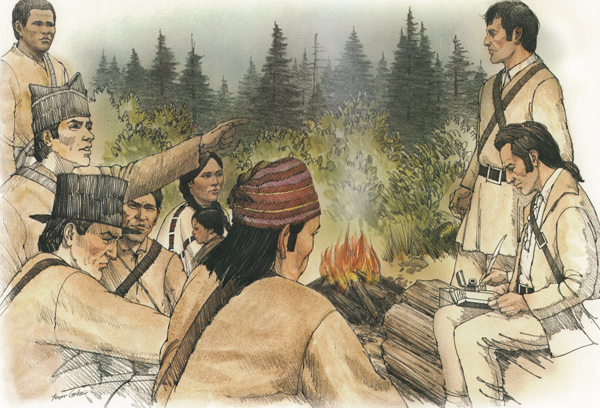Station Camp near Chinook, WA Before deciding where to winter over, Clark recording the opinions of each member including York and Sacagawea. Clark lists the advantages of the southern shore.
Deciding Where to Winter Over
by Roger Cooke
© 2005 Washington State Historical Society. Used by permission.
A Democratic Decision[1]Originally aired weekdays by Yellowstone Public Radio during the Bicentennial observance of 2003-2006. Narrated by Hal Hansen. Scripts by Whit Hansen and Ed Jacobson. Produced by Leni Holliman. © … Continue reading
Celestial Observations
a fare morning. Sent out 6 hunters and Detained to make the following observations i, e,
Took time dis. & azomith of the Sun A M. . . .
observed Time & Distance of Sun & Moons nearest Limbs Sun West P M . . . .
William Clark
Visiting Chinnooks
a Chief and Several men of the Chin nook [Chinook] nation Came to Smoke with us this evening one of the men brought a Small Sea otter Skin for which we gave Some blue beads—
—William Clark
Deciding to Winter Over
At night, the party were consulted by the Commanding Officers, as to the place most proper for winter quarters; and the most of them were of opinion, that it would be best, in the first place, to go over to the south side of the river, and ascertain whether good hunting ground could be found there.
—Patrick Gass
The Most Elk
They generaly agree that the most Elk is on the opposit Shore, and that the greatest numbers of Deer is up the river at Some distance above— The Elk being an animal much larger than Deer, easier to kiled better meat (in the winter when pore) and Skins better for the Clothes of our party
—William Clark
Near the Coast
a convenient Situation to the Sea coast where we Could make Salt, and a probibility of vessels Comeing into the mouth of Columbia (“which the Indians inform us would return to trade with them in 3 months[“]) from whome we might precure a fresh Supply of Indian trinkets to purchase provisions on our return home
—William Clark
A Group Consensus
together with the Solicitations of every individual, except one of our party induced us Conclude to Cross the river and examine the opposit Side, and if a Sufficent quantity of Elk could probebly be precured to fix on a Situation as convenient to the Elk & Sea Coast as we Could find—
—William Clark
A Mild Climate
The Indians are Slighly Clothed and give an account of but little Snow, and the weather which we have experiened Since we arrived in the neighbourhood of the Sea Coast has been verry warm, and maney of the fiew days past disagreeably So. if this Should be the Case it will most Certainly be the best Situation of our naked party dressed as they are altogether in leather.
—William Clark
Weather Diary
Day of the month Wind State of the Weather 24th W fair after rain rained moderately for a Short time this morning
—Meriwether Lewis[2]Some abbreviations have been spelled out.
Middle Village-Station Camp is a High Potential Historic Site along the Lewis and Clark National Historic Trail managed by the U.S. National Park Service. The site provides interpretation and is part of the Lewis and Clark National and State Historical Parks.
Notes
| ↑1 | Originally aired weekdays by Yellowstone Public Radio during the Bicentennial observance of 2003-2006. Narrated by Hal Hansen. Scripts by Whit Hansen and Ed Jacobson. Produced by Leni Holliman. © 2003 by Yellowstone Public Radio. |
|---|---|
| ↑2 | Some abbreviations have been spelled out. |



